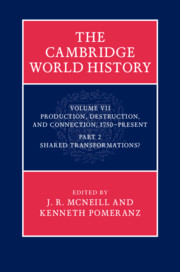Book contents
- The Cambridge World HistoryVolume VII
- The Cambridge World History
- The Cambridge World HistoryProduction, Destruction, and Connection, 1750–Present
- Copyright page
- Contents
- Figures
- Maps
- Tables
- Contributors
- Preface
- Part I Social developments
- Part II Culture and Connections
- 6 Department stores and the commodification of culture: artful marketing in a globalizing world
- 7 Religion after 1750
- 8 Science since 1750
- 9 Music on the move, as object, as commodity
- 10 Sport since 1750
- 11 World cinema
- Part III Moments
- Part IV Ligaments of Globalization
- Index
- References
10 - Sport since 1750
from Part II - Culture and Connections
Published online by Cambridge University Press: 05 May 2015
- The Cambridge World HistoryVolume VII
- The Cambridge World History
- The Cambridge World HistoryProduction, Destruction, and Connection, 1750–Present
- Copyright page
- Contents
- Figures
- Maps
- Tables
- Contributors
- Preface
- Part I Social developments
- Part II Culture and Connections
- 6 Department stores and the commodification of culture: artful marketing in a globalizing world
- 7 Religion after 1750
- 8 Science since 1750
- 9 Music on the move, as object, as commodity
- 10 Sport since 1750
- 11 World cinema
- Part III Moments
- Part IV Ligaments of Globalization
- Index
- References
Summary
- Type
- Chapter
- Information
- The Cambridge World History , pp. 225 - 248Publisher: Cambridge University PressPrint publication year: 2015
References
Further reading
- 1
- Cited by

